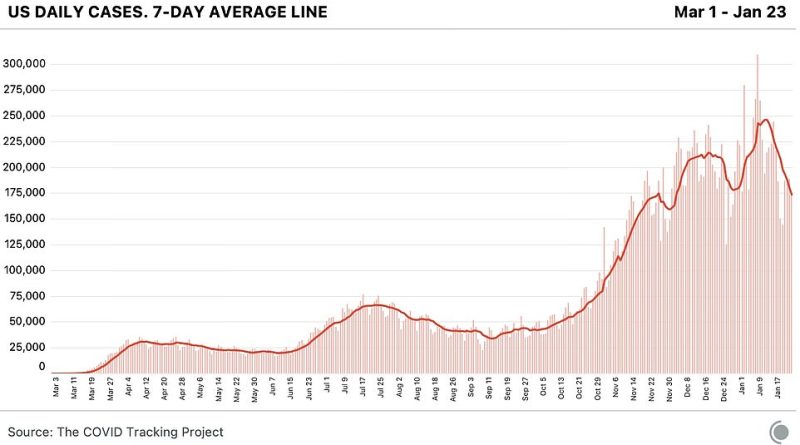New COVID-19 cases on a 7-day average DROP to pre-Thanksgiving levels
COVID-19 cases have fallen to pre-Thanksgiving levels and the number of hospitalizations continues to drop nationwide.
But the number of newly reported fatalities remains high, including in the nation’s most populous county, Los Angeles, even as coronavirus case counts and hospitalizations in hard-hit California continue to fall.
Over the course of the last 24 days, more than 5,000 people in the Los Angeles County region have died due to COVID-19-related complications, according to official data.
That’s nearly half of the total number of those killed in LA County by the disease in the first nine months of the pandemic which began in March of last year.
According to the latest data from The COVID Tracking Project, 3,577 Americans died of COVID-19 on Saturday – a slight decrease from the 3,980 deaths reported on Friday.
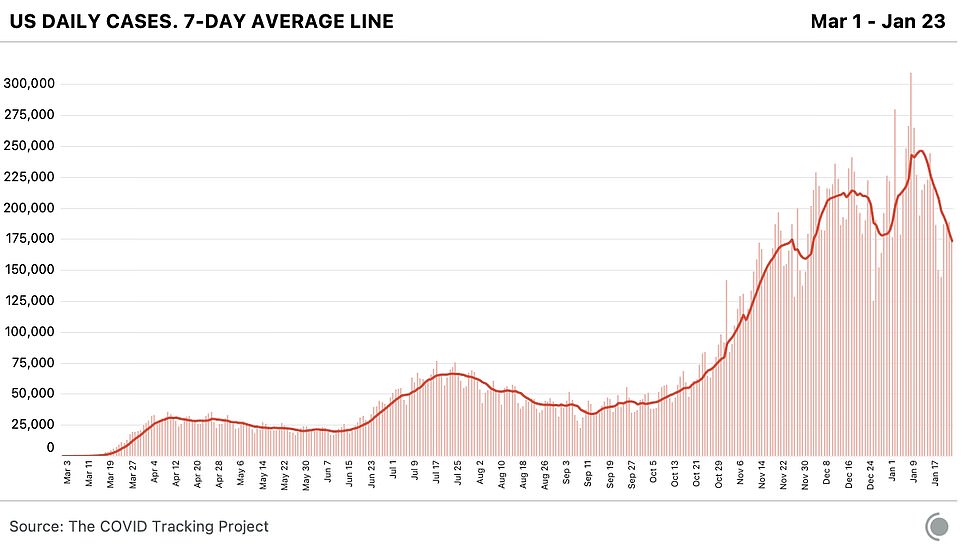
The latest data from The COVID Tracking Project indicates that the seven-day average of newly diagnosed coronavirus cases has dropped to levels not seen since before the Thanksgiving holiday
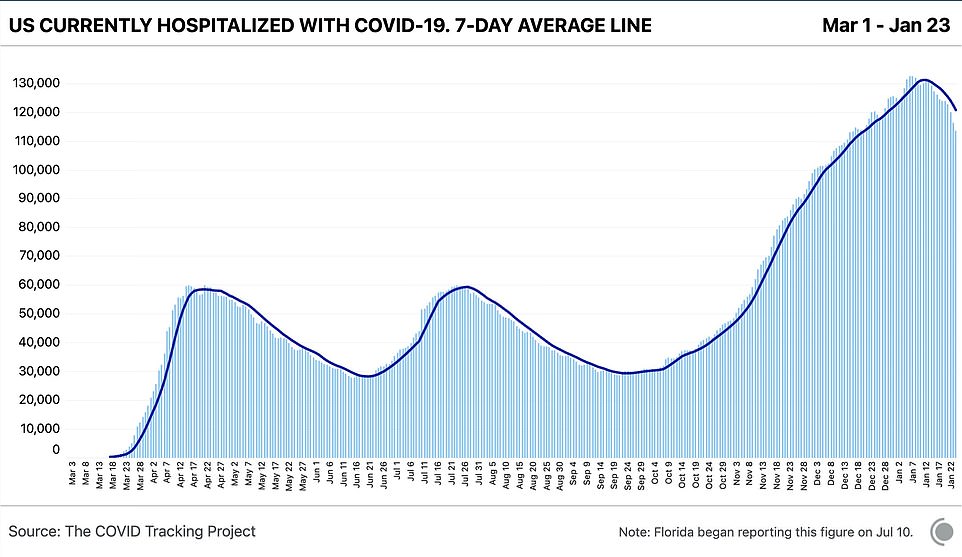
The data also shows a continuing decline in the number of Americans who are being hospitalized with COVID-19
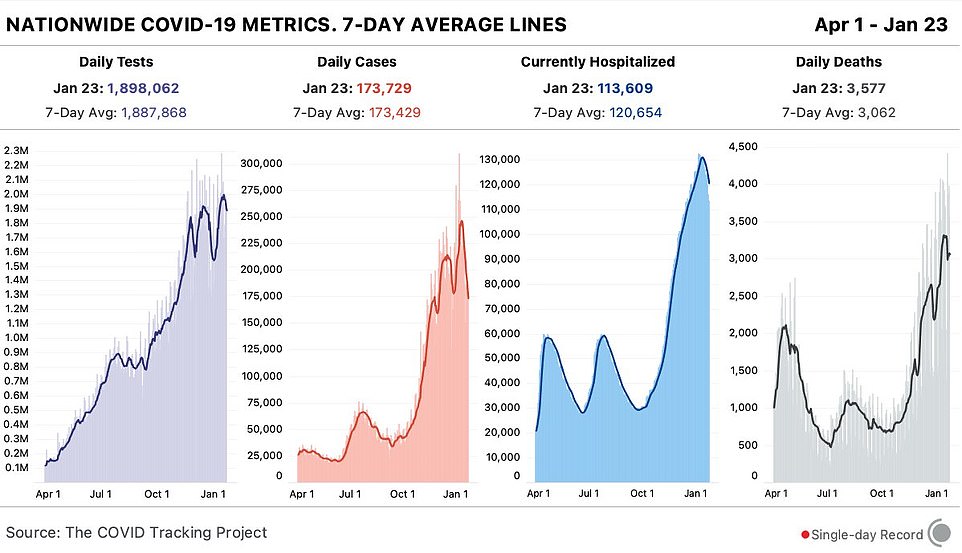
Even though cases and hospitalizations are declining, the number of infections is still three times as high as it was during the summer peak, according to The COVID Tracking Project
There were also fewer Americans who were hospitalized with COVID-19. As of Saturday, 113,609 people were being treated in hospitals for the illness.
That’s a drop from the previous day, when COVID Tracking Project reported 116,264 Americans who were hospitalized with COVID-19.
Just two weeks ago, there were more than 131,000 Americans who were in the hospital receiving treatment for the disease.
On Saturday, there were 173,729 newly diagnosed cases of COVID-19.
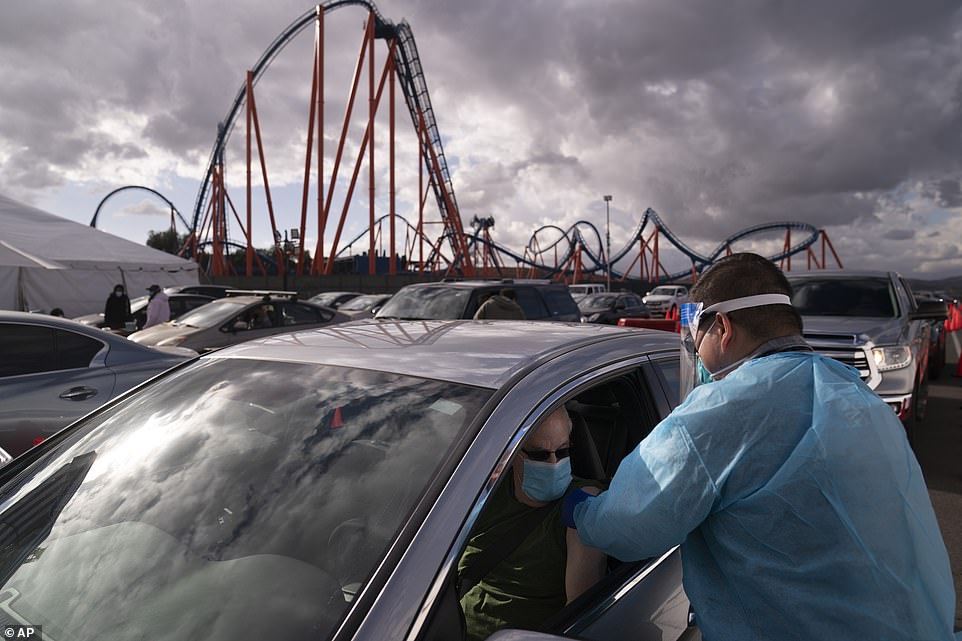
Licensed vocational nurse Joselito Florendo (right) administers the COVID-19 vaccine to Michael Chesler at a mass vaccination site set up in the parking lot of Six Flags Magic Mountain in Valencia, California, on Friday
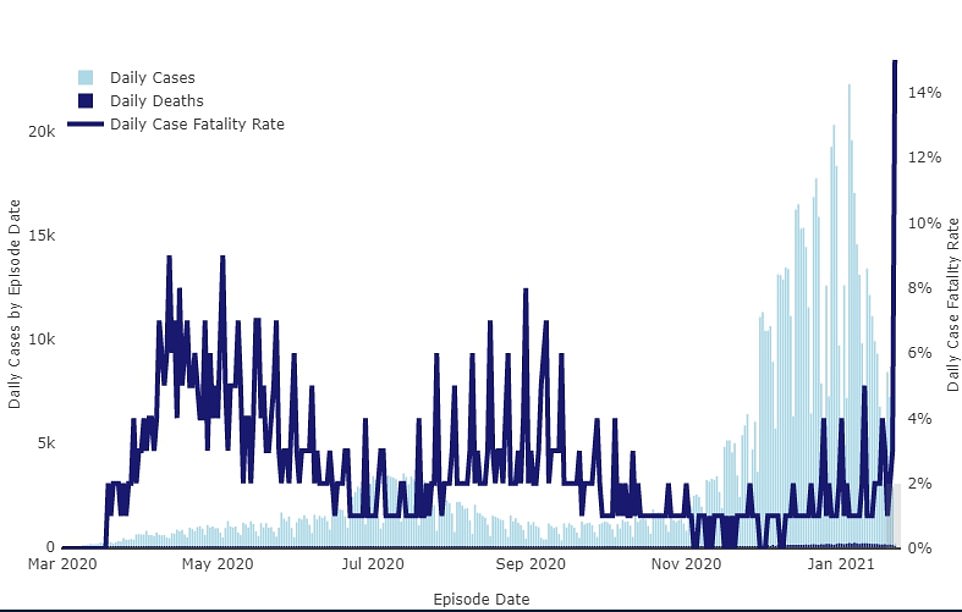
The number of COVID-19 deaths in Los Angeles County, the nation’s most populous county, continues to climb
While the daily case count remains three times higher than it was during the summer peak, there is reason for optimism given that it is continuing on its downward trajectory.
By comparison, there were 188,983 newly diagnosed cases of COVID-19 on Friday.
In the last seven days, there has been a 21 per cent drop in the number of positive cases.
The United States is the nation hardest-hit by COVID-19. Over the past week, 3,089 Americans have died of the disease on average, while 20 US states reported record deaths this month.
Since the start of the pandemic, nearly 25 million Americans have been infected with COVID-19. More than 417,000 have died.
Meanwhile, the nation’s mass vaccination program continues apace.
The Centers for Disease Control and Prevention said it had administered 20,537,990 doses of COVID-19 vaccines in the country as of Saturday morning and distributed 41,411,550 doses.
The tally of vaccine doses are for both Moderna and Pfizer/BioNTech vaccine, the agency said.

The agency said 17,390,345 people had received one or more doses, while 3,027,865 people got the second dose as of Saturday.
A total of 2,437,670 vaccine doses have been administered in long-term care facilities, the agency said.
According to the tally posted on January 22, the agency had administered 19,107,959 doses of the vaccines, and distributed 39,892,400 doses.
The rates of new coronavirus infections and hospitalizations are dropping across California, but health officials warn those trends are tempered by very high death rates.
The state reported 593 deaths on Saturday, a day after recording a one-day record of 764, according to the Department of Public Health.
California’s death toll since the start of the pandemic rose to 36,361, while total cases reached 3,085,040.
Hospitalizations and newly confirmed cases have been falling, however, and health officials are growing more optimistic that the worst of the latest surge is over.
The number of people in the hospital with COVID-19 has slipped below 19,000 statewide, a drop of more than 10 per cent in two weeks.
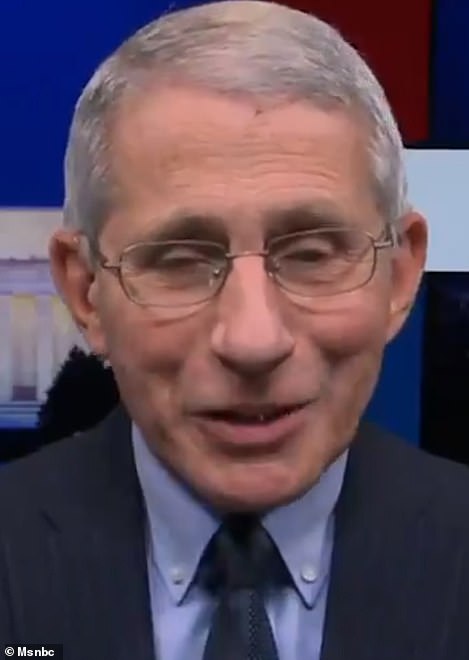
Dr. Anthony Fauci, the federal government’s top infectious disease expert, told MSNBC on Friday that public health officials are closely monitoring two new variants of the coronavirus to see if they are more lethal
The 22,972 new cases reported Saturday are less than half the mid-December peak of nearly 54,000.
In the last week the state averaged about 29,000 new cases per day, more than 6,000 fewer than the prior week.
The positivity rate for people being tested has dropped by 15 per cent statewide in the last week, which means fewer people will end up in hospitals.
In Los Angeles County, the state’s most populous, the test positivity rate has plummeted 39 per cent over the past three weeks, health officials said.
‘While we have come a long way this week with community transmission, we have a long road to go and must continue to practice infectious control measures: wear a face covering and maintain physical distance when out of your home,’ the Los Angeles County Department of Public Health said in a statement on Friday.
Public health experts believe that the lockdowns combined with human behavior including social distancing, the wearing of face coverings, and vaccinations have led to the falling case counts, though they caution that it can be reversed if people let their guard down as certain sectors of the economy come back online.
Gretchen Musicant, the Minneapolis commissioner of health, told The New York Times that state officials were ‘encouraged, but wary.’
Minnesota is slowly lifting restrictions on indoor dining and other businesses where people gather.
‘We’re watching to make sure that those reopenings don’t escalate our rates again,’ Musicant said.
Infectious disease experts say these next three months will be a critical phase in the trajectory of the pandemic.
They say it is a race between the vaccine and the newly discovered mutations of the coronavirus.
‘We’re definitely on a downward slope, but I’m worried that the new variants will throw us a curve ball in late February or March,’ said Caitlin M. Rivers, an epidemiologist at the Johns Hopkins Bloomberg School of Public Health.
Health experts fear that the US could see similar spikes to those experienced in Britain, Ireland, South Africa and Brazil, where new variants of the coronavirus were discovered.
‘I think the next three months could be the worst part of the pandemic,’ said Michael T. Osterholm, director of the Center for Infectious Disease Research and Policy at the University of Minnesota.
‘I hope I’m dead wrong.’
The US is closely watching the more infectious variant of COVID-19 after British officials warned that it may also be more deadly, two top US health officials said on Saturday, cautioning more data is needed.
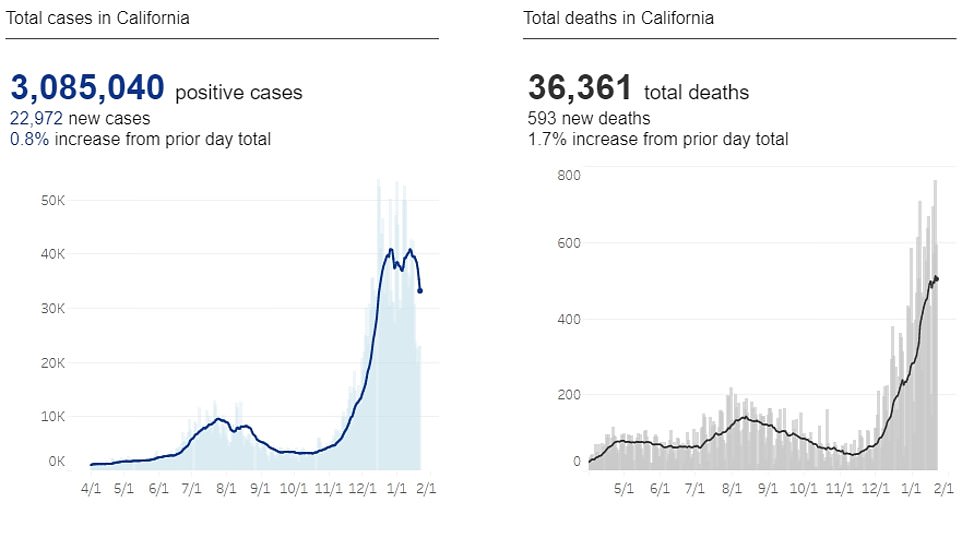
California’s death toll since the start of the pandemic rose to 36,361, while total cases reached 3,085,040
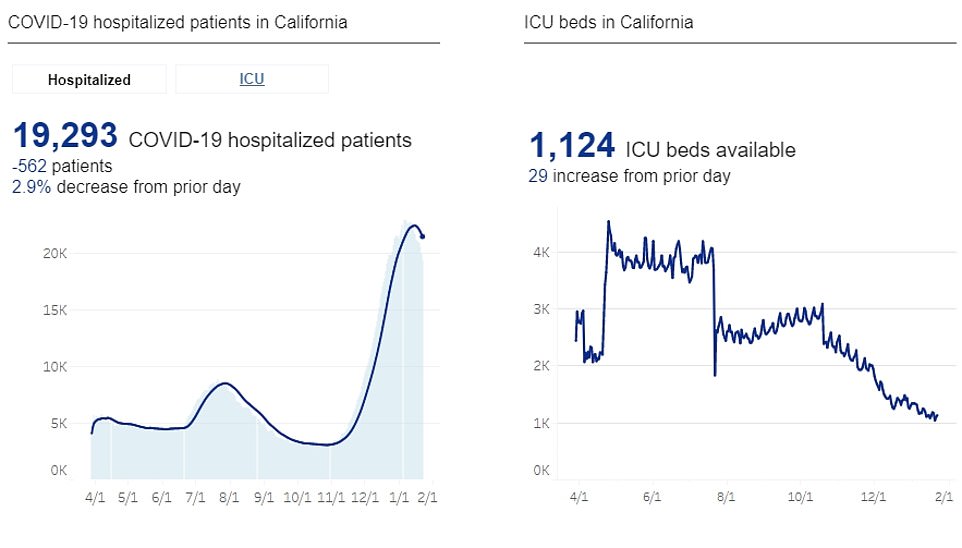
The number of people in the hospital with COVID-19 has dropped more than 10 per cent in two weeks
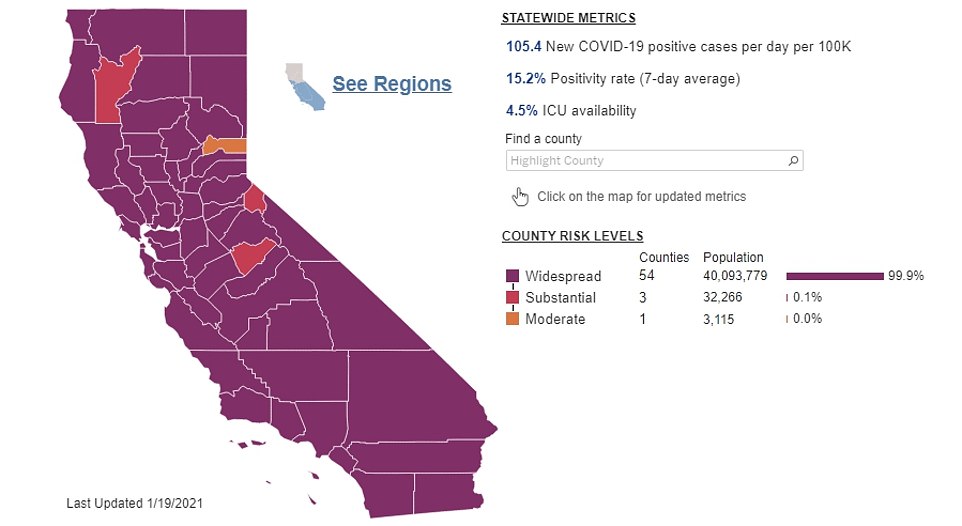
The state reported 593 deaths on Saturday, a day after recording a one-day record of 764, according to the Department of Public Health
Officials are somewhat more worried about a separate variant from South Africa, although it has not yet been identified among US cases of the novel coronavirus, National Institutes of Health (NIH) Director Francis Collins and Dr. Anthony Fauci, President Joe Biden’s top COVID-19 medical adviser, also said.
Collins noted the UK’s data was preliminary, and said it was unclear why those with the UK variant faced a higher risk of death, whether by changes in the virus itself or other external causes such as pressures on the healthcare system.
‘Let’s take this as something to watch closely,’ he told MSNBC in an interview.
Fauci separately told MSNBC that he needed to see the raw data from the UK before fully assessing the mortality risk and that US officials were weighing how the two new strains could impact vaccine efficacy.
‘These are serious situations that we are following very closely and, if necessary, we will adapt to it,’ Fauci said, adding vaccines could be altered in coming months if needed.
Their comments come as President Joe Biden takes the reins of the nation’s COVID-19 response, seeking to re-energize the fight against the highly infectious disease and urging a war-like stance.
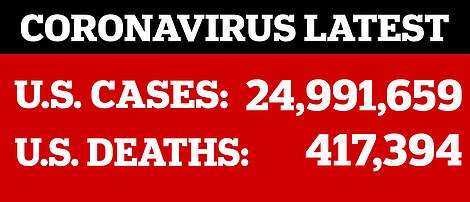
In a flurry of actions since taking office Wednesday, Biden unveiled a new US strategic plan to curtail the outbreak and signed numerous executive orders to boost vaccines and increase mask use, among other measures.
British Prime Minister Boris Johnson on Friday warned that the UK variant was associated with higher level of mortality.
The Centers for Disease Control and Prevention last week warned the UK variant, already circulating in at least 10 US states, could become the dominant variant in the United States by March.
The variant, known as B.1.1.7, is believed to be twice as contagious as the current one circulating nationwide.
‘At the moment we are not alarmed about that,’ Collins said, given that vaccines still appeared effective against it.
‘We are somewhat more concerned about a South African variant.’
Fauci, the top infectious disease expert, echoed his concerns, calling data on the South Africa variant a bit more ‘ominous’ even as current vaccines still appeared to protect against both variants.
Scientists on Wednesday said the South African variant may reduce the efficacy of current vaccines, which also raises the prospect of re-infection.
Britain has banned travelers from some African countries in an attempt to stop the spread of that strain in the United Kingdom and is weighing further restrictions.
Biden has moved to impose a mandatory quarantine for air passengers arriving in the United States, although details have not yet been released.
He is also requiring US-bound passengers to have a negative COVID-19 test starting on Tuesday.
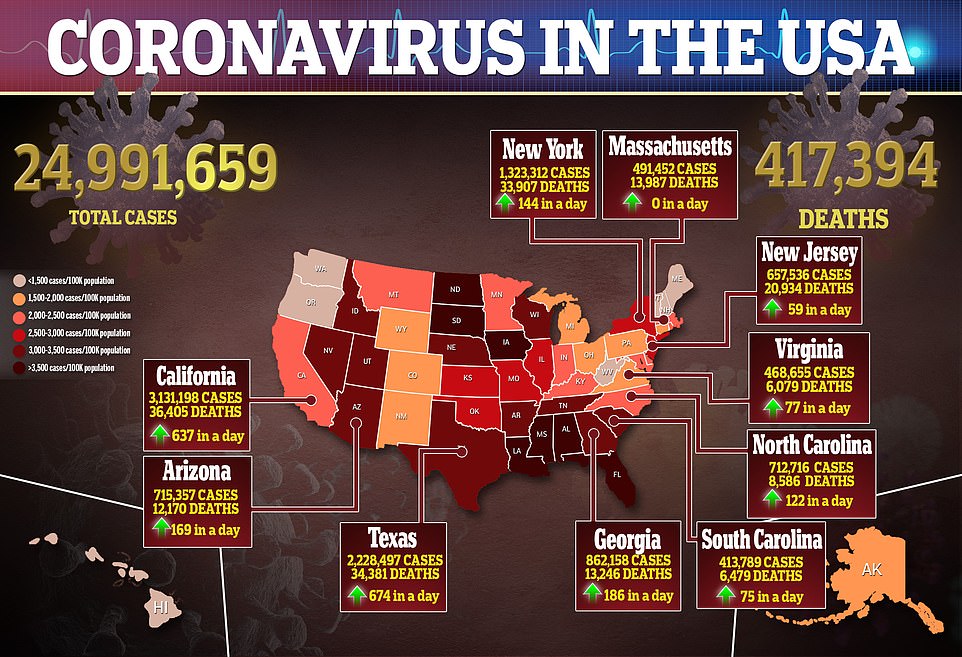
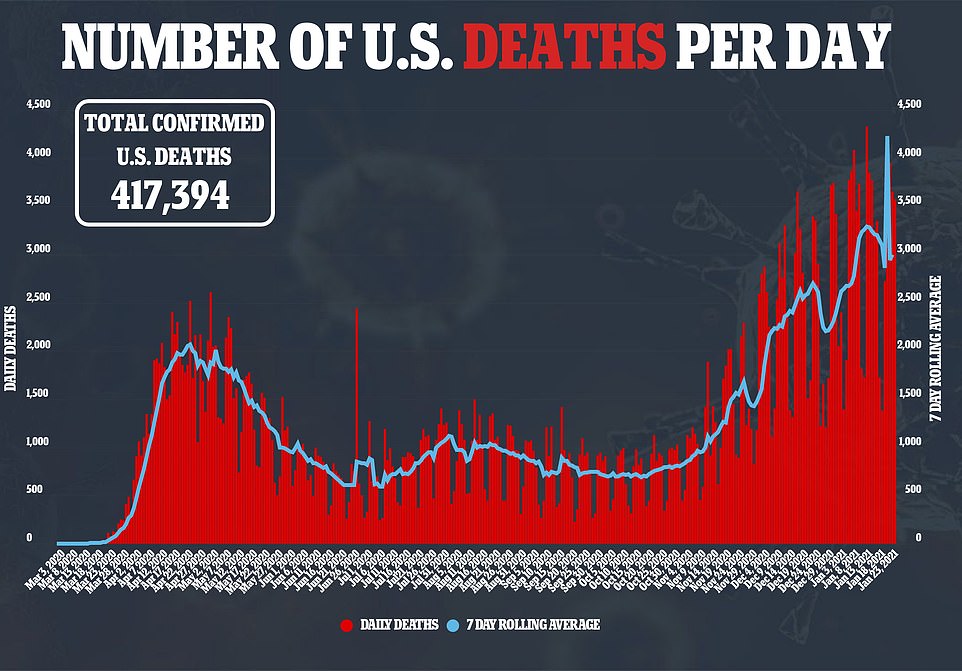
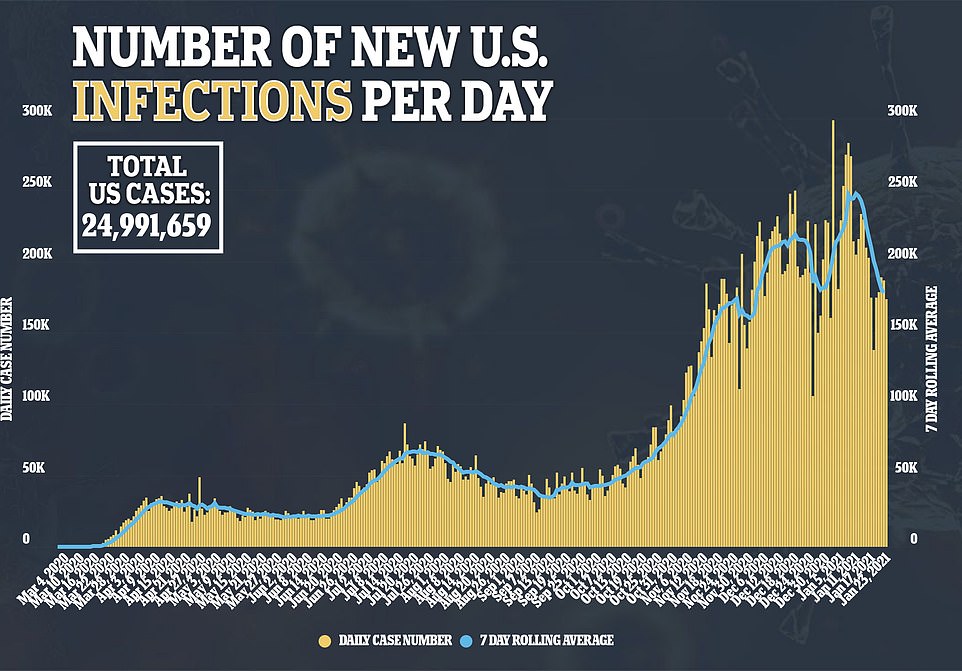
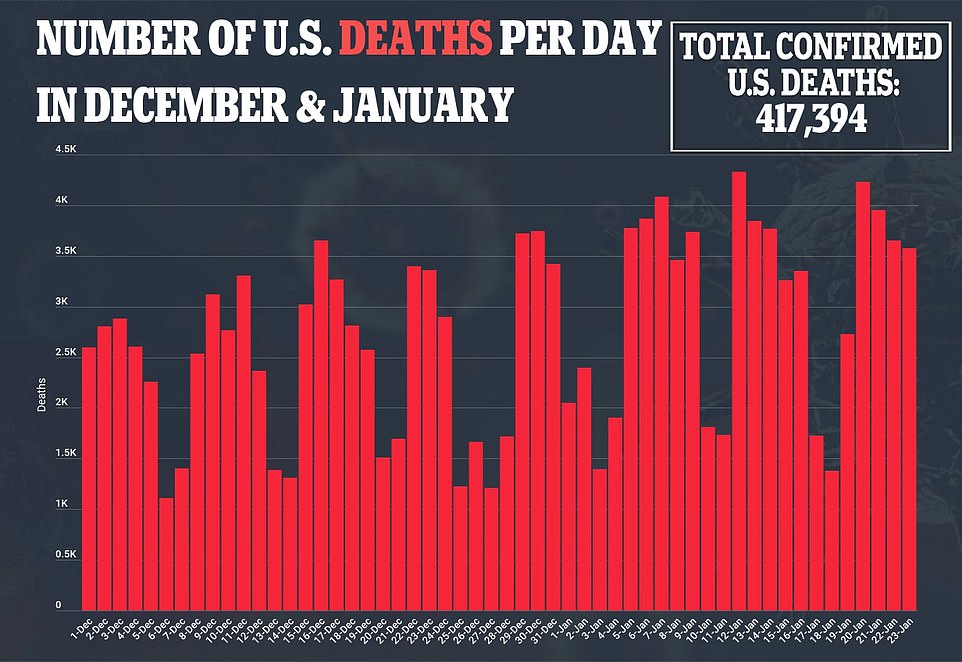
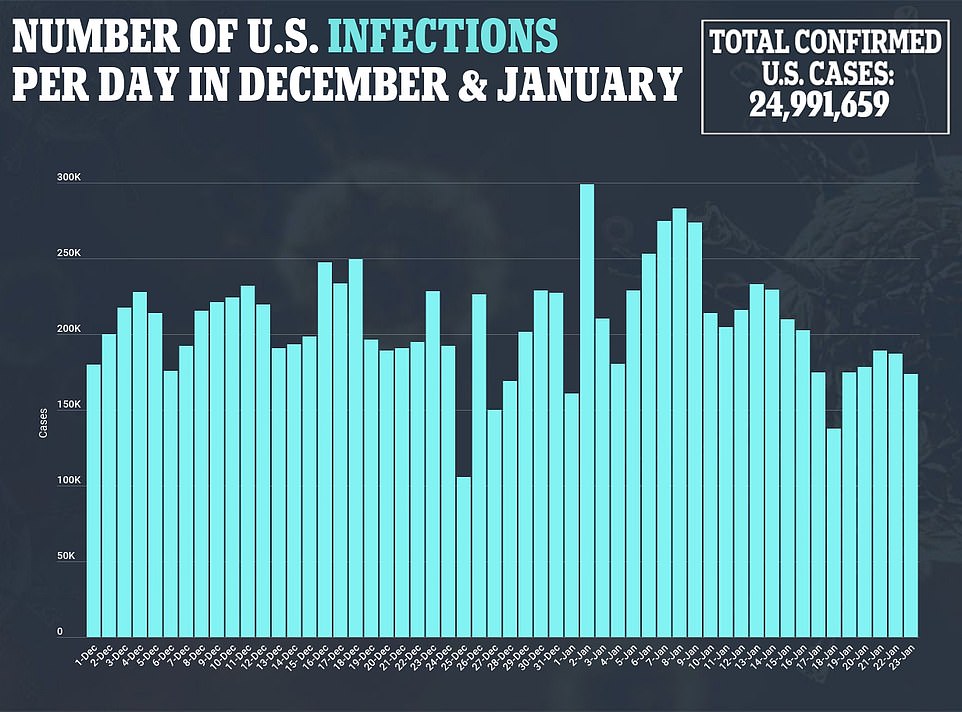
Even without a greater mortality risk, more contagious variants increase the pressure on officials to vaccinate the population – a campaign many state and local officials have said has been slow and chaotic and one Biden has pledged to improve.
‘When you get more cases, you’re going to get more hospitalizations. And when you get more hospitalizations, you’re ultimately going to get more deaths,’ Fauci told reporters at the White House on Thursday.
The entire University of Michigan athletic department is pausing after several positive tests for the new COVID-19 variant.
The state Department of Health and Human Services issued the mandate Saturday, with the school saying it follows the positive COVID-19 tests for several individuals linked to the athletic department.
The entire department could be in quarantine for two weeks.
The 11th-ranked women’s basketball team was set to play at home against Purdue on Sunday.
That was one of four athletic events the school had scheduled. The men’s tennis team was hosting a tournament while women’s tennis was in Atlanta.
The men’s gymnastics event at Nebraska was also postponed.
The seventh-ranked men’s basketball team wasn’t supposed to play until Wednesday at Penn State.
‘Canceling competitions is never something we want to do, but with so many unknowns about this variant of COVID-19, we must do everything we can to minimize the spread among student-athletes, coaches, staff, and to the student-athletes at other schools,’ athletic director Warde Manuel said.

